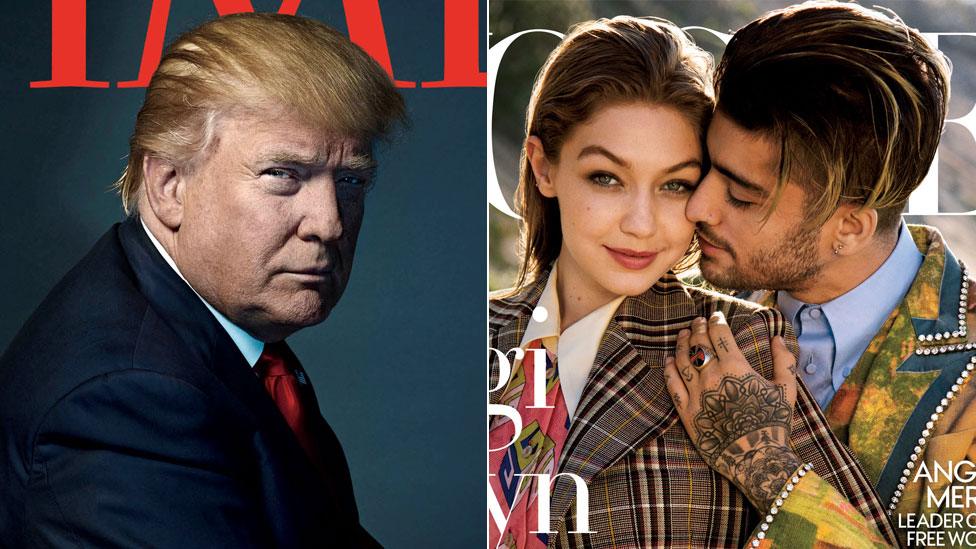Teen Vogue: How will going online-only affect readers?
- Published
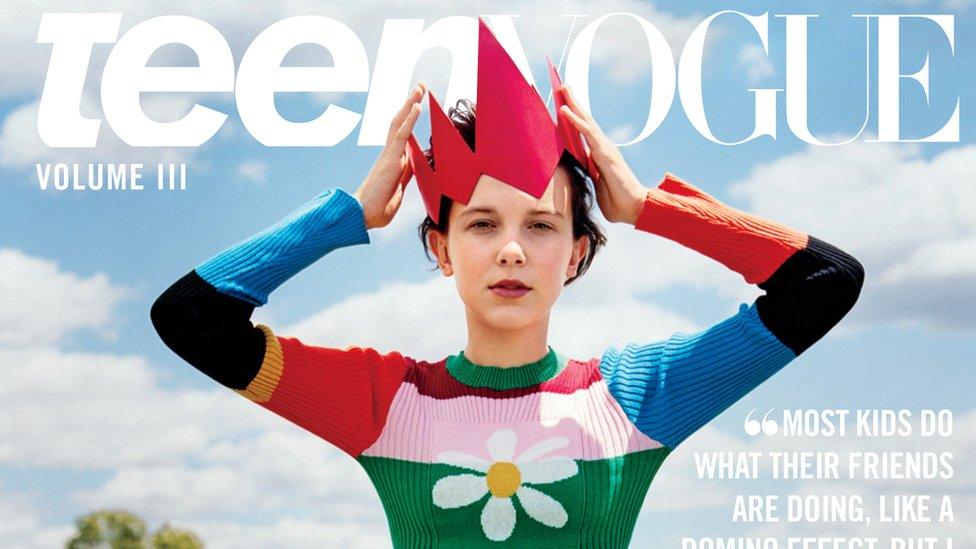
Millie Bobby Brown (from Netflix's Stranger Things) was a recent cover star
Clicks don't lie. And Teen Vogue gets a lot of them.
A highly-successful website. Six million Facebook likes. A huge following on Snapchat. Three and a half million Twitter followers. There's no doubt Teen Vogue's digital game is strong.
The quarterly print magazine, however, hasn't been having quite the same impact recently. So they're closing it.
Parent company Conde Nast is planning to focus on Teen Vogue's digital content instead - which has been going from strength to strength.
The brand has increased its political coverage and social activism in recent years while still delivering its entertainment, fashion and beauty content.

A visit to Teen Vogue's website, external gives you some idea about why the formula has been so successful. (Warning: Doing this can make you lose hours from your day).
Its headlines are light and relatable, with many written in the first person.
"Selena Gomez and Justin Bieber Just Cuddled in Coordinating Outfits."
"Cats Can Get Acne Too and Now I Feel Less Alone."
"Dove Cameron Freaked Out Over Pink Dressing as Her for Halloween and Honestly Same."
"Louis Tomlinson Savagely Trolled Niall Horan and I Can't Stop Laughing."
While the above headlines, all from this week, might make zero sense to anyone outside the target audience, they do a great job of making many of us go 'Ooh that sounds interesting' - *click*.
"They've got a fantastic product and content," says Sarah Penny, Fashion Monitor, external's head of content.
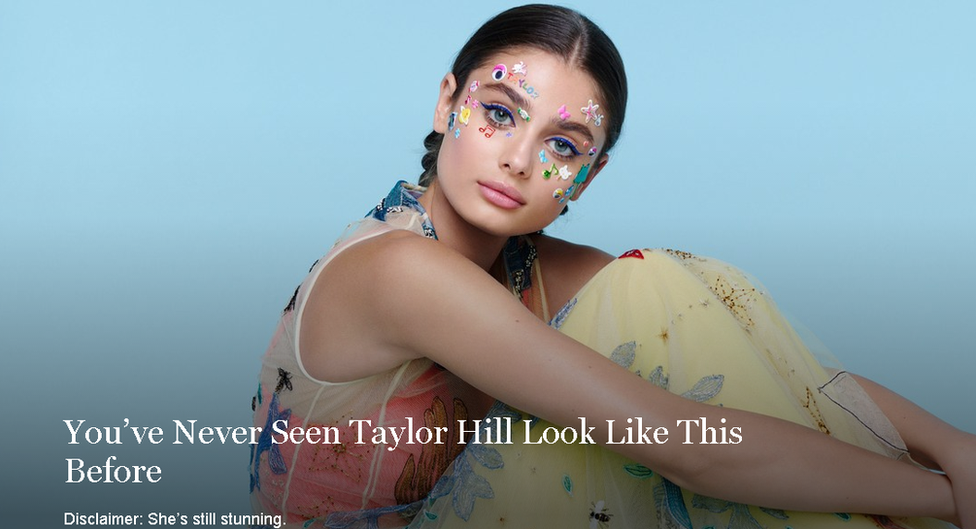
"For the demographic they are targeting, they really push the boundaries and provide something new that isn't just celebrity, fashion and beauty for teens."
But, she adds: "They're also not ones to sit on the fence - you only have to look at any of their Trump commentary."
"They really came into their own during the election and the fact that they provide accessible current affairs for a young audience is really pioneering and exciting for a teen magazine, which in turn is alluring for their target audience."
This might explain the social media reaction to the news that the print magazine was closing:
Allow X content?
This article contains content provided by X. We ask for your permission before anything is loaded, as they may be using cookies and other technologies. You may want to read X’s cookie policy, external and privacy policy, external before accepting. To view this content choose ‘accept and continue’.
Allow X content?
This article contains content provided by X. We ask for your permission before anything is loaded, as they may be using cookies and other technologies. You may want to read X’s cookie policy, external and privacy policy, external before accepting. To view this content choose ‘accept and continue’.
We contacted Teen Vogue, who stressed the growth and expansion of the digital brand, adding that they'll likely still do the occasional print special.
"Though the quarterly print editions will cease publishing on a regular schedule, we will explore re-imagined special issues timed to specific moments, as we do in social," a spokesman told BBC News.
"As audiences continue to evolve around content consumption, we will modernise and calibrate how, where and when we produce and distribute our content to be in sync with the cultural moments and platforms most important to our audiences."
The closure of the print edition is likely to result in up to 80 job losses, according to Variety, external, and it's not the only changes Conde Nast announced this week.
Some of their other titles like GQ, Allure and Glamour will drop from 12 to 11 print issues per year.
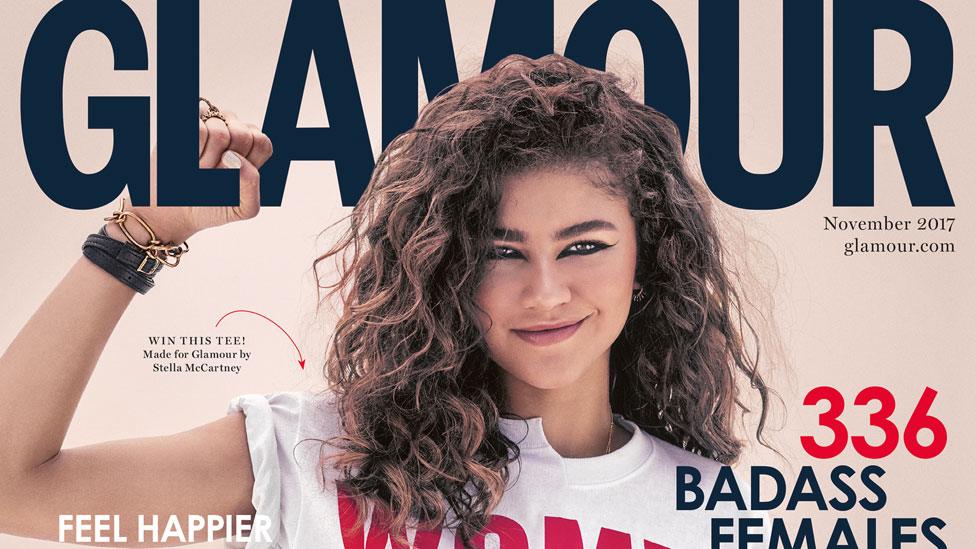
Glamour has also announced this month that it will be going online only
Teen Vogue's move to an exclusively online product follows in the footsteps of the British version of Glamour, which did the same thing earlier this year.
"Conde Nast is doing all of a sudden and dramatically what most major magazine publishers have been doing steadily and quietly for the last 10 years - cutting their cost base to match their reduced revenues," says David Hepworth, whose magazine career has included editing Smash Hits and launching Just Seventeen, Q, Empire and Heat.
But, he cautions: "There are very few cases of magazines going digital-only and managing to retain the lustre on their brand. Once you let paper go you're just another website. You're just more space junk floating around out there."
(The term 'space junk' definitely isn't used enough these days is it.)
Teen Vogue has seen its online operation grow under Philip Picardi, who joined as digital editorial director in 2015.
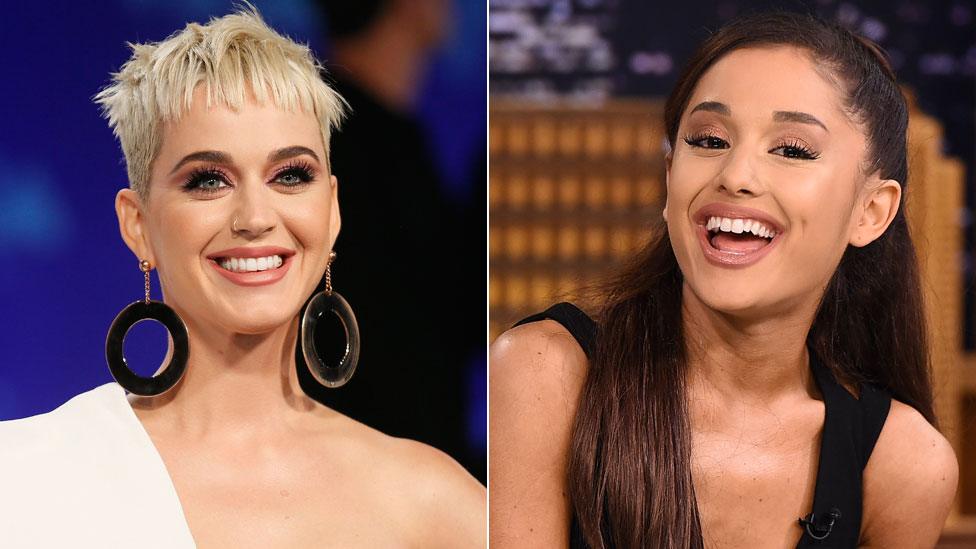
Katy Perry and Ariana Grande have both appeared on the cover of Teen Vogue
"Because of the amount of attention we've received in the press and I think on social, we are looked at as a brand that is safe to pitch for, if you have a story that's not been told before," Picardi told Business of Fashion, external this month about the brand's digital success.
"Now we feel empowered to be more activist and be bolder about the statements that we're making and the stances that we're taking. And so that's a completely different ballpark to be playing in."
And bolder they have been. Teen Vogue, as BoF points out, has been taking strong stances on politics, LGBTQ issues, the gender pay gap and birth control.
Pretty good for a publication that was once dismissed has having little to offer beyond mascara reviews.
But while its digital operation is growing, Hepworth thinks Conde Nast may end up regretting closing the physical edition.
"All this talk about migrating from print to digital ignores the monetary facts," he says.
"Unless you've come up with a fundamentally different way of doing business - and the fact that this announcement comes so suddenly suggests Conde Nast haven't and are just hoping - you're exchanging pounds for pennies.
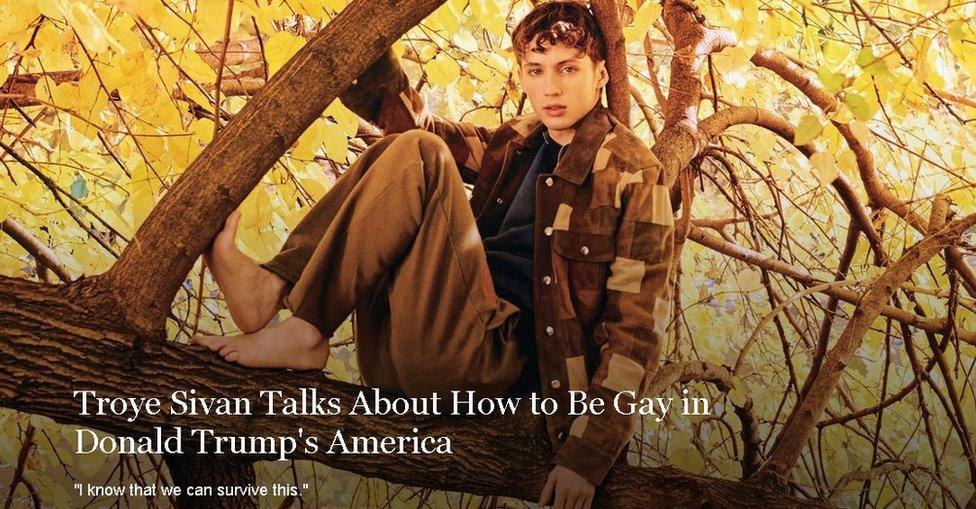
Teen Vogue's content has become much more political in recent years
"If you give something away, the only revenue you make is from advertising and the value of online advertising has been falling for years."
He advises Teen Vogue readers: "Remember, if you pay for something, you're the customer. If you get something for free you're the product."
Penny thinks, though, that there was only so much money that could be made from print anyway, and points out the decline in physical sales of magazines in general.
"Print is a very difficult medium to sustain, particularly within this Generation-Z readership," she says.
"They're really the first demographic to have grown up with a digital presence from birth so naturally have an incredibly strong affinity with online consumption - even more so than millennials."
Teen Vogue say they are "aggressively investing in the brand" and pointed to the "tremendous audience growth across its digital, social and video platforms this past year".
Conde Nast will be hoping they can keep that momentum going in the coming months.
Provided readers of the print magazine are okay with swapping pages for clicks, the chances are Teen Vogue should be just fine.

Follow us on Facebook, external, on Twitter @BBCNewsEnts, external, or on Instagram at bbcnewsents, external. If you have a story suggestion email entertainment.news@bbc.co.uk.
- Published6 October 2017

- Published12 August 2017
